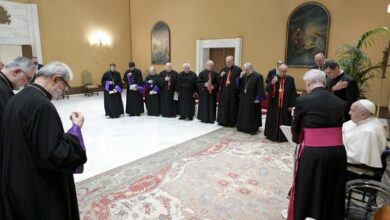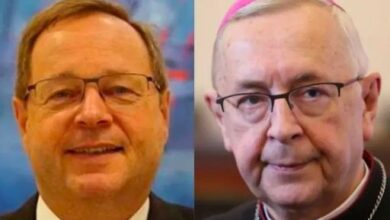Take down his art or not: Who is alleged serial abuser Father Marko Rupnik?
 Father Marko Rupnik, SJ. / Credit: Vatican News/Screenshot
Father Marko Rupnik, SJ. / Credit: Vatican News/Screenshot ACI Prensa Staff, Jul 16, 2024 / 16:50 pm (CNA).
Father Marko Ivan Rupnik is a former Jesuit priest whose artwork decorates Catholic churches, chapels, and shrines around the world, including the Redemptoris Mater chapel in the Vatican and the major seminary of Rome. He is accused of having committed serious sexual, spiritual, and psychological abuse of women for decades and his case is currently being investigated by the Vatican.
Rupnik’s career
Rupnik, 69, was born in 1954 in Zadlog, Slovenia. During his youth he studied at the School of Fine Arts in Rome and at the Pontifical Gregorian University, where he earned a doctorate with a thesis on the theological significance of modern art in the light of Russian theology.
In the 1980s in his native country with the nun Ivanka Hosta he founded the Loyola Community, where he allegedly abused nuns.
He is also the founder of the Centro Aletti spiritual art workshop in Rome, from where many of the accusations of abuse have also come.
Six years since the first allegations
According to a timeline released by the Society of Jesus, the first accusations against Rupnik were received in October 2018 for giving absolution in confession to an accomplice in a sin against the Sixth Commandment.
In May of the following year, the investigation led by the Society of Jesus considered the accusations credible and a file was sent to the Congregation — now the Dicastery — for the Doctrine of the Faith (CDF), which launched a criminal administrative process.
In May 2020, the Vatican confirmed the facts and declared Rupnik to be in a state of “latae sententiae” (automatic) excommunication. The excommunication lasted only two weeks, as it was lifted by a CDF decree that same month.
In June 2021, new accusations came in regarding Rupnik and some members of the Loyola Community, so the Society of Jesus established a preliminary investigation and imposed restrictions on the priest.
The CDF stated in October 2022 that the statute of limitations had expired and that no trial could proceed despite the Jesuits urging the Vatican to begin criminal proceedings.
However, in December 2022, the case was in the news again after the appearance of new alleged victims of Rupnik in Rome, this time related to the Aletti Center.
In his capacity as Vatican commissioner for the Loyola Community, dissolved in December 2023, the now assistant for consecrated life of the Holy Father, Bishop Daniele Libanori, confirmed the veracity of the abuse against the nuns of which Rupnik is accused.
The Society of Jesus expelled Rupnik in June 2023, and the Diocese of Koper, Slovenia, incardinated him in August 2023.
In October 2023, Pope Francis lifted the statute of limitations on the case and ordered that the Dicastery for the Doctrine of the Faith begin a judicial process, after detecting “serious problems in the way the case was handled.”
In February, two alleged victims of Rupnik made their first public appearance and shared their heartrending testimony at a press conference in Rome.
Although expelled from the Jesuits, Rupnik continues to appear as a Jesuit and Vatican consultant in the 2024 Pontifical Yearbook.
World-famous artist
Rupnik has created numerous religious works of art around the world and is especially known for his easily recognizable mosaics.
In 1996, St. John Paul II entrusted him with the renovation of the mosaic in the Redemptoris Mater chapel in the apostolic palace in the Vatican.
Three years later, the “Pilgrim Pope” presided over the rite of dedication of the chapel, where Rupnik and his team had restored the Wall of the Incarnation, the Wall of the Ascension and Pentecost, and the Wall of the Parousia.
In February 2011, Rupnik’s Aletti Center renovated the main chapel inside the building of the Spanish Bishops’ Conference in Madrid.
Also in the Spanish capital, the Slovenian priest decorated the main sacristy, the chapter house, and the Blessed Sacrament chapel in the Almudena Cathedral.
In addition, the priest artist did the art for the main altar wall of the shrine to the Holy Trinity in Fátima, Portugal, located in front of the site of the apparitions of the Virgin Mary, and his work is also found at the Lourdes shrine in France.
In Italy, Rupnik designed the ramp and crypt of the lower Church of St. Pio of Pietrelcina, in San Giovanni Rotondo, where thousands of Catholic faithful come to venerate Padre Pio.
He also decorated the chapel of the Pontifical Major Roman Seminary in Italy with his famous mosaics; the Manresa Cave shrine in Spain, where the artist painted 90 faces of biblical figures; the Church of Our Lady of the Southern Cross in Australia; the Aparecida Shrine in Brazil; and the Knights of Columbus’ Holy Family Chapel in New Haven, Connecticut.
Rupnik was the author of the logo of the Jubilee of Mercy convened by Pope Francis on Dec. 8, 2015, and was also commissioned to create the official image for the 10th World Meeting of Families that took place in Rome from June 22–26, 2022.
Should Rupnik’s artworks be removed or not?
Earlier this month, the bishop of Lourdes, France, Jean-Marc Micas, stated that the Rupnik mosaics should be removed, but he refrained from making a final decision on their fate in the face of “strong opposition.”
Cardinal Seán O’Malley, president of the Pontifical Commission for the Protection of Minors and a member of the C9 council of cardinals that advises Pope Francis, asked in a letter that “pastoral prudence would prevent displaying artwork in a way that could imply either exoneration or a subtle defense” of those of accused of abuse.
The cardinal’s letter appeared a week after the prefect of the Vatican Dicastery for Communication, Paolo Ruffini, defended the use of his art.
Ruffini noted that there is no official verdict yet and that “anticipating a decision is something that, in our opinion, is not good.” Furthermore, he asserted that “removing, erasing, destroying art has never been a good choice.”
At the same time, the lawyer for the alleged victims, Laura Sgrò, called for the removal of the mosaics in a letter written on behalf of five complainants and addressed to the bishops.
The Knights of Columbus announced July 10 that it will cover the Rupnik mosaics located in the two chapels of the National Shrine of St. John Paul II in Washington, D.C., and in the chapel in the Knights’ headquarters in New Haven, Connecticut.
Supreme Knight Patrick Kelly told EWTN News that his work will be covered at least until the Vatican’s formal investigation is completed.
This story was first published in December 2023 and has been updated by ACI Prensa, CNA’s Spanish-language news partner. It has been translated and adapted by CNA.





